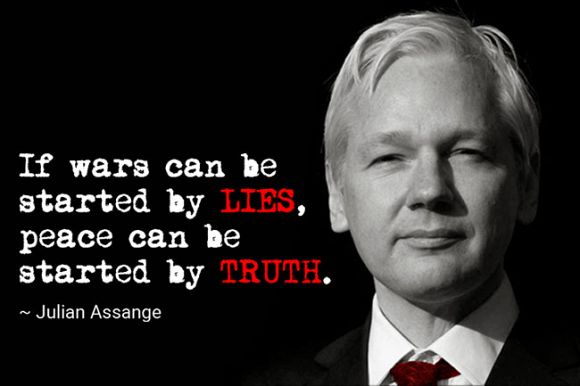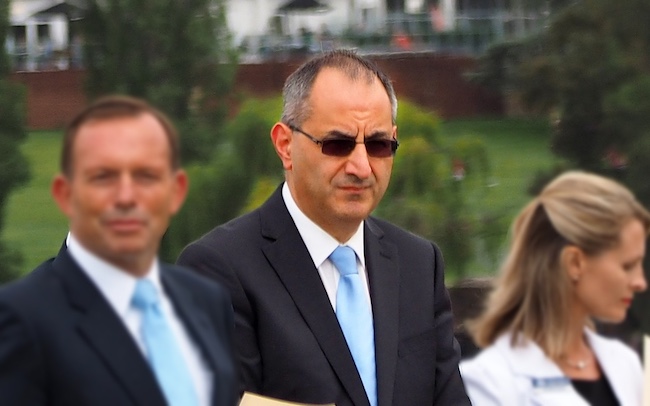News that Julian Assange may be offered a plea deal by the U.S. remains clouded in uncertainty, writes Dr Binoy Kampmark.
BE WARY OF what Washington offers in negotiations at the best of times. The empire gives and takes when it can; the hegemon proffers in equal measure and withdraws offers as it deems fit. This is all well known to the legal team of WikiLeaks’ founder Julian Assange, who, the Wall Street Journal “exclusively” reveals, is in ongoing negotiations with U.S. Justice Department officials on a possible plea deal.
As things stand, the U.S. Department of Justice is determined to get its mitts on Assange on the dubious strength of 18 charges — 17 confected from the brutal Espionage Act of 1917. Any conviction from these charges risks a 175-year jail term, effectively constituting a "death sentence" for the Australian publisher.
The wartime statute, which was intended to curb free speech and muzzle the press for the duration of the First World War, was assailed by Wisconsin Republican Senator Robert La Follette as a rotten device that impaired “the right of the people to discuss the war in all its phases”.
It was exactly in time of war that the citizen needs to:
“... be more alert to the preservation of his right to control his government. He must be most watchful of the encroachment of the military upon the civil power.”
And that encroachment is all the more pressing, given the Act’s repurposing as a weapon against leakers and publishers of national security material. In its most obscene incarnation, it has become the U.S. Government’s political spear against a non-U.S. national who published U.S. classified documents outside the United States.
The plea deal idea is not new. In August last year, the Sydney Morning Herald pounced upon comments from U.S. Ambassador to Australia Caroline Kennedy that a “resolution” to the Assange imbroglio might be on the table. “There is a way to resolve it,” the ambassador suggested at the time.
Any such resolution could involve a reduction of any charges in favour of a guilty plea, subject to finalisation by the Department of Justice (DOJ). Her remarks were heavily caveated: this was more a matter for the DOJ than the State Department or any other agency.
She said:
“So, it’s not really a diplomatic issue, but I think there absolutely could be a resolution.”
The Wall Street Journal now reports that officials from the DOJ and Assange’s legal team 'have had preliminary discussions in recent months about what a plea deal could look like to end the lengthy legal drama'. These talks “remain in flux” and “could fizzle".
Redundantly, the Journal reports that any such agreement 'would require approval at the highest levels of the Justice Department'.
Barry Pollack, one of Assange’s legal representatives, has not been given any indication that the Department would, as such, accept the deal, a point he reiterated to Consortium News:
“We have been given no indication that the Department of Justice intends to resolve the case.”
One floated possibility would be a guilty plea on a charge of mishandling classified documents, which would be classed as a misdemeanour. Doing so would take some of the sting out of the indictment, which is currently thick with felonies and one conspiracy charge of computer intrusion.
Speculation from the paper follows:
Under the deal, Assange could potentially enter that plea remotely, without setting foot in the U.S. The time he has spent behind bars in London would count toward any U.S. sentence and he would be likely to be free to leave prison shortly after any deal has concluded.
With little basis for the claim, the report lightly declares that the failure of plea talks would not necessarily be a bad thing for Assange. He could still 'be sent to the U.S. for trial', where 'he may not stay for long, given the Australia pledge'.
The pledge in question is part of a series of highly questionable assurances given to the UK Government that Assange’s carceral conditions would not include detention in the supermax ADX Florence facility, the imposition of notorious Special Administrative Measures and the provision of appropriate healthcare.
Were Assange to receive a sentence, it would be open to him to apply and serve its balance in Australia. But all such undertakings have been given on condition that they can be broken, and delays, inconsistencies and bad faith have plagued transfer deals between the U.S. and other countries.
The dangers and opportunities to Assange have been bundled together, a sniff of an idea rather than a formulation of a concrete deal. And deals can be broken. It is hard to imagine that Assange would not be expected to board a flight bound for the United States, even if he could make his plea remotely.
Constitutional attorney Bruce Afran, in an interview with CN Live! last August, suggested that a plea – taken internationally – was:
“... not barred by any laws. If all parties consent to it, then the court has jurisdiction.”
Yes, but what then?
In any event, once on U.S. soil, nothing is stopping a grand volte-face, that nasty legal practice of tagging on new charges that would carry even more onerous penalties. It should never be forgotten that Assange would be delivered to a country whose authorities had contemplated, at points, abduction, illegal rendition and assassination.
Either way, the current process is one of gradual judicial and penal assassination, conducted through prolonged proceedings that continue to assail the publisher’s health even as he stays confined to Belmarsh Prison. (Assange awaits the UK High Court’s decision on whether he will be granted leave to appeal the extradition order from the Home Office.)
The concerns will be how to spare the WikiLeaks founder further punishment while still forcing Washington to concede defeat in its quest to gaol a publisher. Unfortunately, that quest remains ongoing.
Dr Binoy Kampmark was a Cambridge Scholar and is a lecturer at RMIT University. You can follow Dr Kampmark on Twitter @BKampmark.
Related Articles
 This work is licensed under a Creative Commons Attribution-NonCommercial-NoDerivs 3.0 Australia License
This work is licensed under a Creative Commons Attribution-NonCommercial-NoDerivs 3.0 Australia License
Support independent journalism Subscribe to IA.














